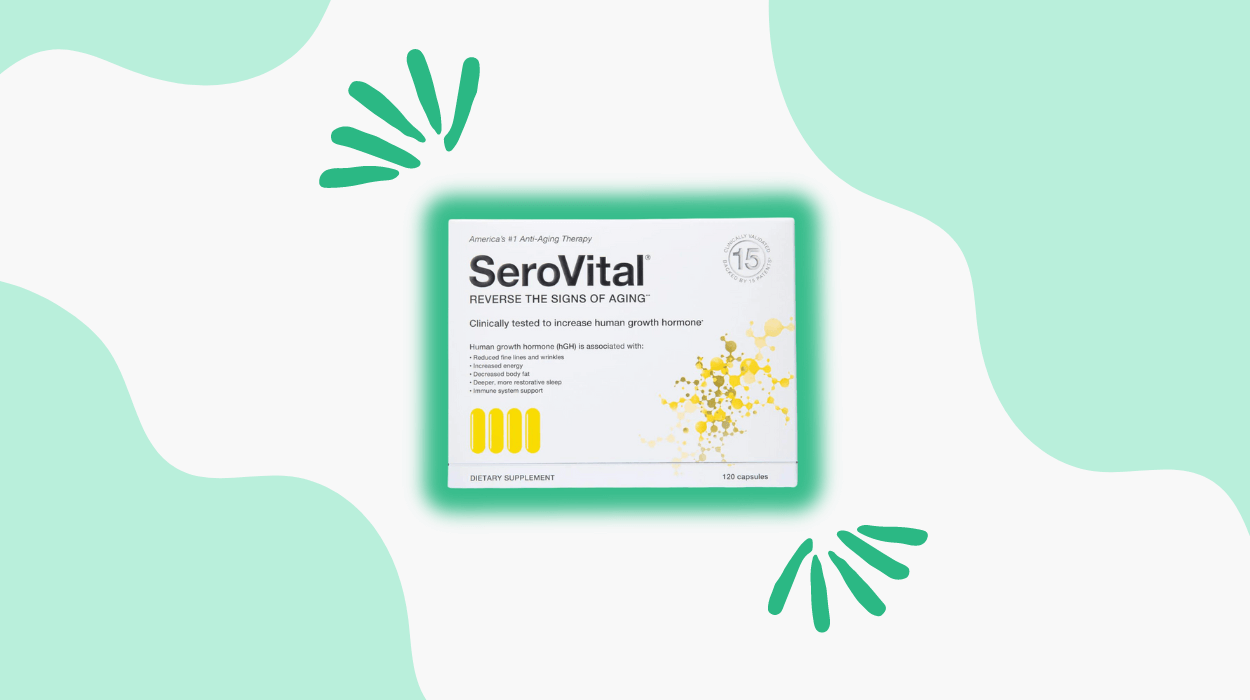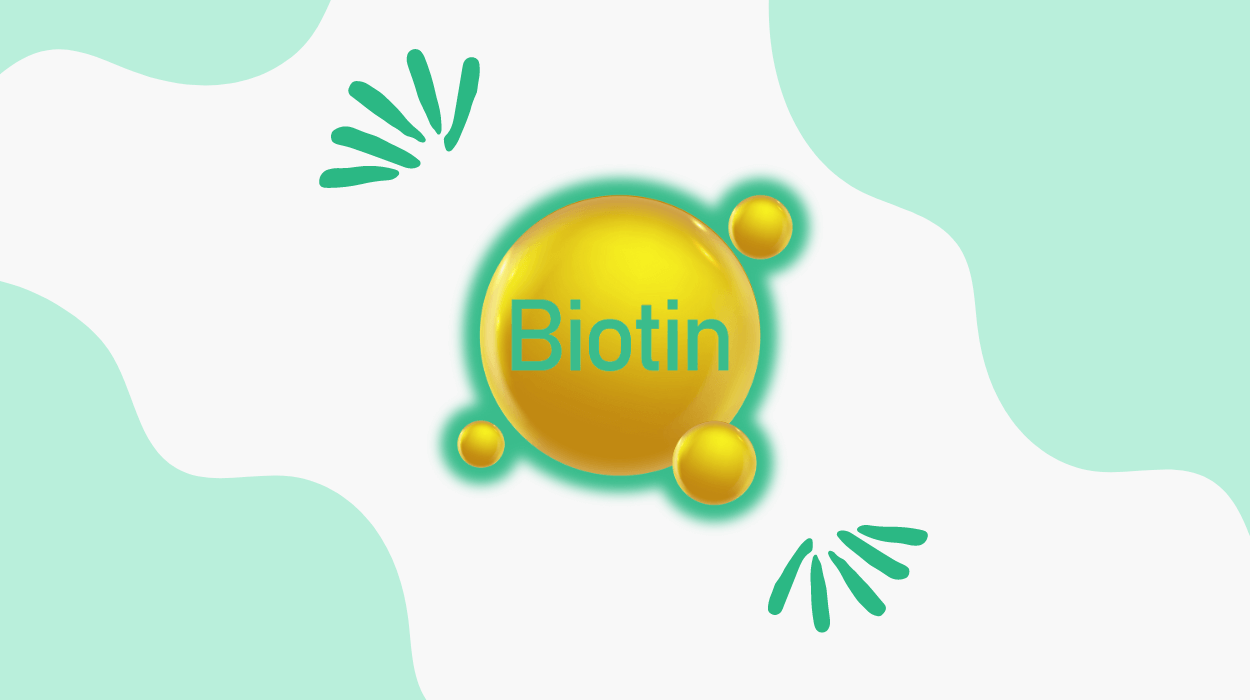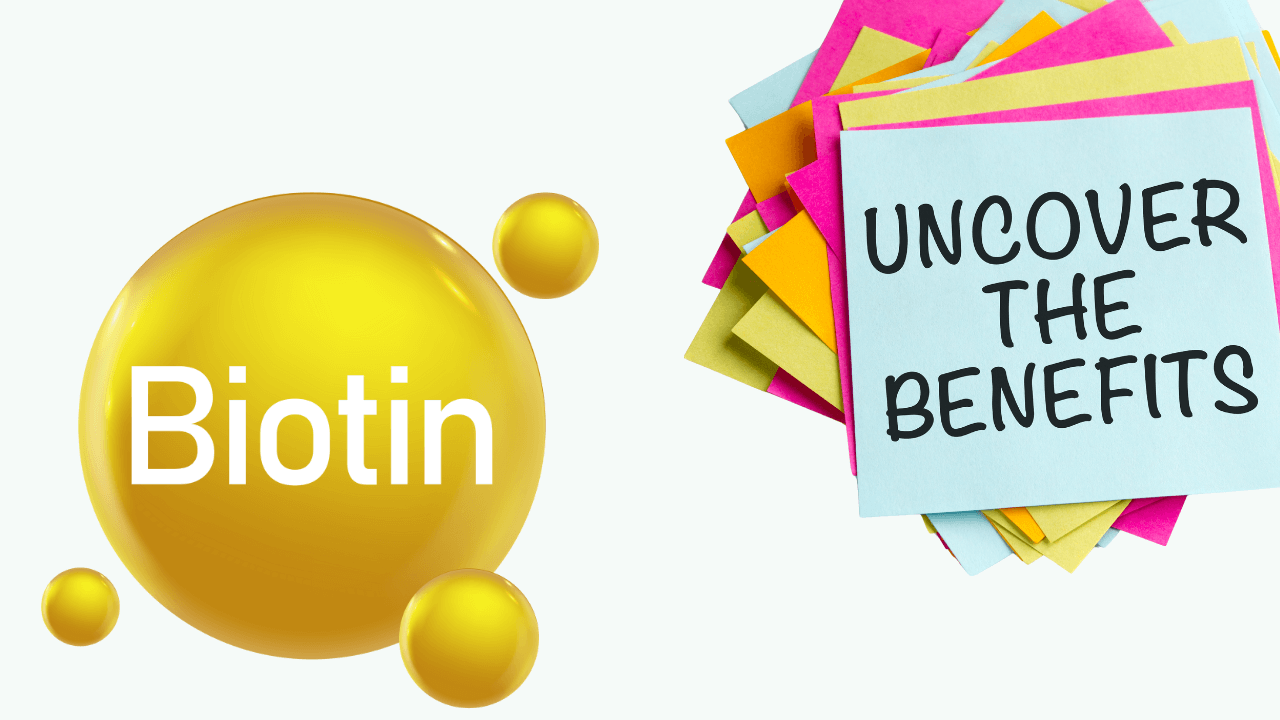

Biotin, also called vitamin H or B7, could help maintain healthy hair, skin, and nails. Research suggests that biotin may help stabilize blood sugar levels, which might lower the risk of diabetes.
Vitamin B7 helps break down fats, carbohydrates, and other substances in the body, providing steady energy levels. The body cannot produce biotin in sufficient amounts, which means you should obtain it through diet or supplementation.
Many people have experienced stronger, shinier hair and healthier skin thanks to adequate biotin intake. Biotin may also support healthy neurological function, promoting brain health and cognitive well-being.
This article discusses the health benefits associated with biotin and the recommended biotin dose to obtain such benefits. The article also explores some healthy food sources of biotin and the proper ways to consume biotin.
Some natural foods that may offer a high biotin profile may include:
Nuts like peanuts, pecans, and walnuts could help you obtain biotin naturally. Legumes like whole grains, soybeans, and cereals also contain good amounts of biotin. Cauliflower, bananas, and mushrooms may also help fulfill your daily biotin requirements.

Low biotin levels might result in various skin issues, including rashes, acne, dermatitis, and psoriasis. Biotin produces fatty acids essential for moisturizing the skin and keeping it healthy. Adequate biotin levels may give your skin a clear complexion.
Biotin helps maintain the skin’s protective barrier, which shields it from toxins, environmental pollutants, and pathogens. A strong skin barrier helps prevent moisture loss and protects against damage, leading to healthier-looking skin.
Biotin may help ensure oil glands function optimally, which may prevent skin issues like acne, spots, or blemishes.
Biotin may promote keratin production, which is a structural component of hair. Adequate keratin levels could help stimulate hair growth, making your hair denser and less prone to breakage. It supports oil production in the scalp, nourishing them and improving hair growth.
Keratin is also present in the nail matrix, improving its strength and appearance. Research suggests that biotin intake could increase the thickness of brittle nails, making them less prone to breakage and improving overall nail health.
For those experiencing conditions like uncombable hair syndrome or brittle nail syndrome, biotin formulations have shown promising results in improving the growth and quality of hair and nails.
Pregnant women having adequate biotin levels may potentially reduce the risk of congenital disorders in newborns. Biotin is vital for embryonic growth during pregnancy, which might help prevent the likelihood of certain congenital disabilities.
Research indicates that around one-third of pregnant women may have a biotin deficiency. The deficiency may contribute to an increased risk of congenital disabilities like short limbs, cleft palates, and skeletal abnormalities in newborns.
Pregnant women should ensure sufficient biotin intake, ideally at least 30 mcg per day during pregnancy and 35 mcg per day while breastfeeding. Following these guidelines could help reduce the risk of congenital disabilities in their newborns.
However, pregnant women should consult a doctor to discuss biotin consumption. The doctor may provide guidance tailored to personal needs and help prevent potential congenital disabilities associated with biotin deficiency.
Biotin acts as a coenzyme, assisting in the breakdown of macronutrients like fats, carbohydrates, and proteins. Such a process helps the body extract energy from food more efficiently.
Vitamin B7 could potentially increase the resting metabolic rate or the number of calories burned during rest. A higher metabolic rate may enable quicker food breakdown and support weight loss efforts.
Biotin has anti-inflammatory properties that might reduce inflammation, including in the arteries. Chronic inflammation may cause high blood pressure, so reducing inflammation could indirectly help manage blood pressure.
Biotin’s anti-inflammatory effects may help reduce symptoms associated with allergies, such as nasal congestion, skin rashes, and respiratory issues. It could target and soothe the inflammatory response, offering relief from allergic reactions.
Chronic inflammation is linked to multiple diseases, including cardiovascular conditions, autoimmune disorders, and neurodegenerative illnesses. Biotin might minimize inflammation, which may potentially slow down disease progression.
Gut inflammation may cause digestive issues, discomfort, and improper nutrient absorption. Biotin’s anti-inflammatory properties could soothe gut inflammation and help reduce such discomforts.
Skin conditions like eczema, psoriasis, and acne are often linked to inflammation. Biotin’s anti-inflammatory nature might help reduce redness, swelling, and skin irritation, promoting healthier skin overall.
Multiple sclerosis (MS) may affect the central nervous system. It occurs when the immune system unknowingly harms myelin (the protective layer of nerve fibers), leading to inflammation and damage.
Biotin could activate an enzyme called acetyl-CoA carboxylase, which helps repair and regrow myelin (the protective layer around nerves). Such a mechanism may help repair damaged myelin in people with MS, possibly reducing symptoms like fatigue or numbness.
High-dose biotin formulations could potentially reduce symptoms like difficulty walking and muscle weakness in some people with MS. Biotin’s ability to support myelin synthesis may help protect nerves from further damage in people with multiple sclerosis.
Research suggests that adequate biotin levels may promote heart health by improving blood circulation and lipid profiles. These factors are significant in reducing the risk of heart disease.
Biotin assists in the breakdown of fats and cholesterol in the body, specifically targeting LDL (bad) cholesterol. Reduced LDL cholesterol may prevent plaque accumulation in the arteries, potentially reducing the risk of atherosclerosis, heart attacks, or strokes.
| Benefits of Biotin in Heart Health | Description |
|---|---|
| Improves Blood Flow | Enhances circulation in the cardiovascular system. |
| Modulates Lipid Profiles | Helps in increasing HDL and decreasing LDL levels. |
| Reduces Risk of Heart Disease | Contributes to a healthier heart and decreases heart disease risk. |
| Supports Cardiovascular Function | Aids in maintaining optimal heart health. |
| Enhances Cholesterol Levels | Promotes a balance between good and bad cholesterol. |
Biotin could increase the production of white blood cells, helping strengthen the body’s defense against pathogens and illnesses. It could stimulate a healthy immune response, helping combat infections and diseases.
The immune system synthesizes antibodies to identify and eliminate harmful substances like bacteria and viruses. Biotin may help increase the body’s natural ability to produce antibodies, supporting a more effective immune response.
Biotin helps maintain the integrity of mucous membranes. These membranes could act as a physical barrier against pathogens, preventing them from infiltrating the body and causing infections.
Biotin helps your body make more insulin, a hormone that controls your blood sugar. It also assists in breaking down carbohydrates into glucose, helping maintain stable blood sugar levels.
A deficiency in biotin could negatively impact glucose metabolism, insulin response, and overall blood sugar levels. People with diabetes may have naturally lower serum biotin levels, causing difficulties maintaining stable blood sugar levels.
When combined with chromium picolinate, biotin could improve insulin sensitivity and might contribute to better metabolic outcomes.
Biotin assists in synthesizing proteins, the building blocks of muscle tissue. Adequate biotin levels ensure optimal protein formation, accelerating muscle repair and growth after exercise or an injury.
It could support the growth and development of muscle cells, forming new muscle fibers and improving size and strength. Biotin also fuels the muscle cells by providing the necessary energy to repair and grow.
Biotin’s anti-inflammatory effects could help reduce muscle inflammation and soreness, promoting quicker recovery and less downtime between workouts.
The thyroid gland produces hormones like triiodothyronine (T3) and thyroxine (T4) that control metabolism, energy levels, and overall metabolic rate. Biotin could help synthesize these thyroid hormones, ensuring optimal thyroid function.
Thyroid and adrenal glands rely on energy to function properly. Biotin may help metabolize carbohydrates, fats, and proteins and convert these nutrients into usable energy, ensuring optimal function.
Biotin may help bodily cells grow and function properly. It acts as a helper for enzymes that are involved in various processes, such as making energy and building important molecules.
It may help regulate gene expression, such as insulin receptor and glucokinase genes, which manage blood sugar. It also suppresses the gene expression of phosphoenolpyruvate carboxykinase. These mechanisms could help maintain normal cellular functions.
In laboratory settings, biotin is added as a nutrient mix to grow cells. These cells need biotin to make fatty acids, which helps develop cell membranes and other cellular structures.
Biotin is essential for the function of certain enzymes called carboxylases. These enzymes may help make essential fatty acids.
One of the main enzymes it helps is called acetyl-CoA carboxylase. The enzyme turns a molecule called acetyl-CoA into another molecule called malonyl-CoA, which is a vital step in producing fatty acids.
Studies suggest that the production of fatty acids drops significantly if biotin is blocked by a compound called avidin. The findings indicate that biotin is necessary for making fatty acids.
Biotin attaches to special proteins called histones. When biotin attaches to these histones, it may change how tightly the DNA is packed. The process helps control when and how DNA gets copied and repaired, which is important for making new DNA.
It helps control the activity of certain genes that are needed to produce DNA. For instance, biotin may regulate gene activity that is responsible for producing nucleotides, the building blocks of DNA.
DNA (deoxyribonucleic acid) is present in bodily cells. It contains the genetic information needed for your normal bodily functions, development, growth, and reproduction.
If you experience signs like hair loss, cracks in the corners of the mouth, skin rashes, or loss of appetite, it might indicate a biotin deficiency. Increasing biotin intake might help alleviate such symptoms and support overall health.
Adequate biotin intake may help boost your metabolism, reduce inflammation, boost immunity, and stabilize blood sugar. Consuming egg yolks, nuts, seeds, legumes, or organ meats could help naturally fulfill your daily biotin requirements.
However, excess biotin intake daily might do more harm than good. It may cause potential side effects like digestive discomfort, nausea, excessive urination, or insomnia.
Tyler Read earned an undergraduate academic degree from Sonoma State University, California and is a certified personal trainer (CPT) with NASM (National Academy of Sports Medicine). With over 16 years of experience, Tyler has trained clients both online and in-person.
He is passionate about helping others turn their love for fitness into a career. Tyler has worked with many local and commercial gyms before establishing his successful private personal training business, which he continues to operate.
